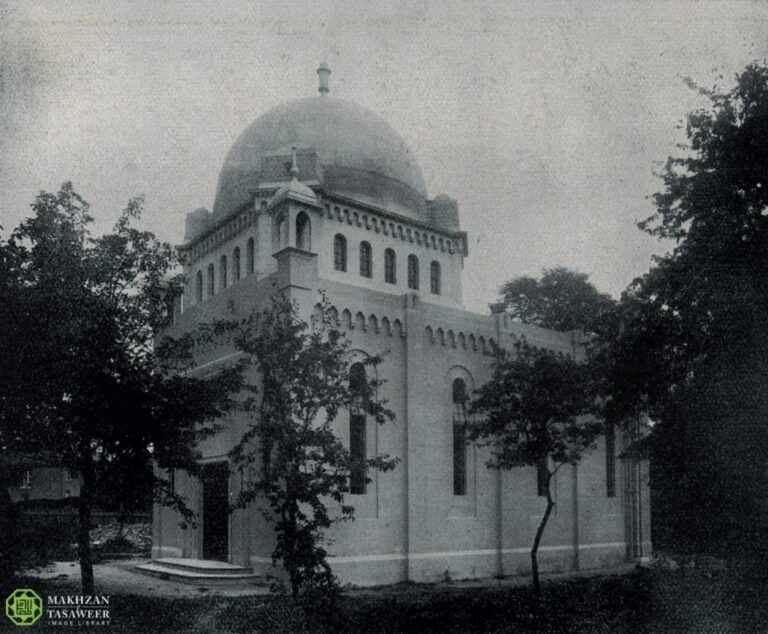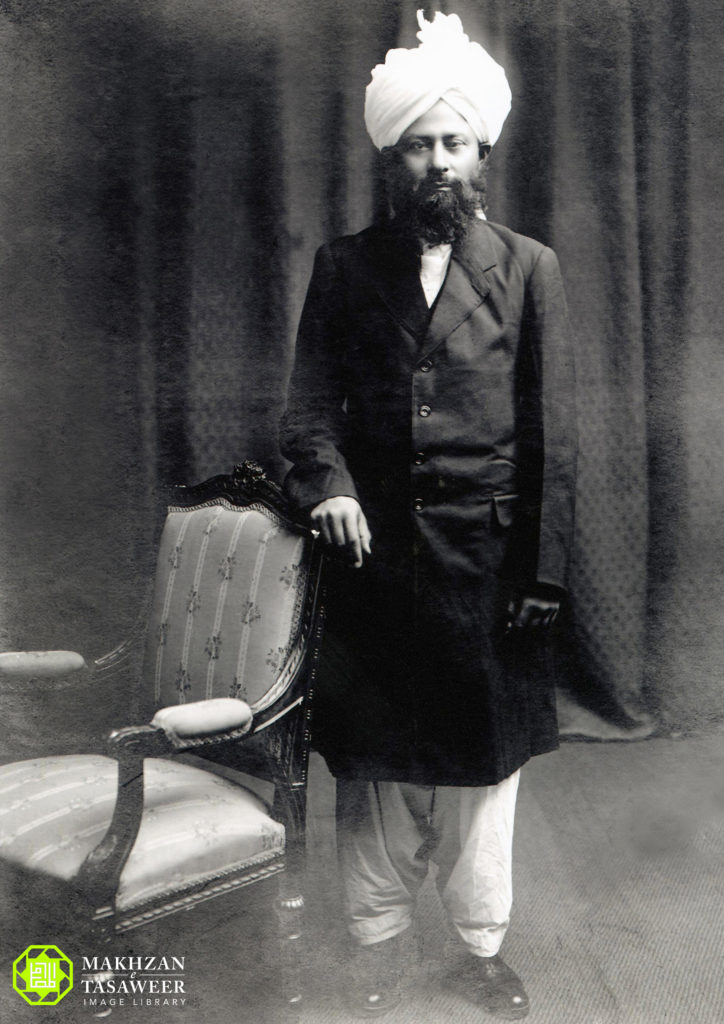Friday Sermon
28 August 2020
Men of Excellence
After reciting the Tashahud, Ta‘awuz, and Surah al-Fatihah, Hazrat Khalifatul Masih Vaa said:
In this era, according to His promise, Allah the Almighty sent the Imam of the Age, the Promised Messiah and Mahdi in subservience to the Holy Prophetsa as the Hakam [judge] and Adl [just arbiter]. The Hakam and Adl was to gather all Muslims as one Ummah [nation] in light of the true teachings of Islam. He was to eliminate the erroneous interpretations and subsidiary disputes of the various groups and sects, thereby uniting the Muslims under one Ummah.
Today, we see that Muslims from every sect, who have carefully pondered and felt the pain owing to the disputes between various sects within Islam, have used their knowledge, wisdom and prayer and joined the community of the Promised Messiahas. Each year, hundreds of thousands continue to join the fold.
The Ahmadiyya Jamaat has not been established on the basis of differences that exist between various sects and groups, or owing to their differences of opinion, or their difference in their interpretations and commentaries; rather, this community has been established in the Latter Days by the true servant of the Holy Prophetsa in accordance with the prophecy made by the Holy Prophetsa and the promise of Allah the Almighty. Having pledged allegiance to the Promised Messiahas, it is this community that will bring an end to the disputes between the Shias and the Sunnis or between any other group or sect for that matter; and thus enable them to become united as one Ummah. We are to establish a single Ummah by informing the Muslims of the true teachings of Islam.
The Promised Messiahas was commissioned for this purpose and established this community in accordance with the commandment of Allah the Almighty. In order to fulfil this task, Allah the Almighty revealed to the Promised Messiahas that he should “gather together all Muslims who are on the Earth under one religion.” (Tadhkirah, p. 763, [English Edition, 2009])
After the Promised Messiahas, this task is now the responsibility of the community established by him and is to be carried out by pledging allegiance to the institution of Khilafat. By the grace of Allah the Almighty, this is exactly what we have been doing for the past 130 years. Or if we consider it from the inception of Khilafat, then we have been fulfilling this task for the past 112 years, whereas prior to this, the Promised Messiahas was carrying out this duty. Not only are we conveying the teachings of the Holy Quran, sunnah [practice] of the Holy Prophetsa and the authentic ahadith [sayings of the Holy Prophetsa] in light of the profound explanations of the Imam, Hakam, and Adl of this age to Muslims, but we are also conveying the beautiful teachings of Islam to non-Muslims and thus bringing them into the fold of Islam.
In this manner, the community of the Promised Messiahas – the Hakam and Adl – has been established to eliminate the differences [between Muslims] and despite facing opposition, lawsuits, hardships and verbal abuse, we continue to spread the message of peace and harmony and extend our prayers for everyone.
Indeed, we will never stop from spreading the true message and speaking the truth, and for this we continue to offer sacrifices as well. We have never resorted to violence or used foul language, nor will we ever do so. Divine communities face opposition and have to endure injustices as well, but ultimately, Allah the Almighty grants them victory.
As I mentioned, we will continue to pray and strive to spread the message of the Imam of the Age to the people of every religion in every country. At the same time, I say to all Muslims – those who possess an earnest disposition, those who are in search of the truth, those who possess knowledge and wisdom and desire to bring an end to all conflict and discord – that they ought ponder over this matter.
Aside from the initial few decades, Muslims have been embroiled in discord for centuries, as a result of which their unity and oneness has weakened. Currently, we are passing through the month of Muharram, which is the first month of the Islamic calendar.
Upon the New Year, according to the Gregorian calendar, we congratulate one another; however, it is unfortunate that on the occasion of the Islamic New Year, it is marred with violence and bloodshed owing to the sectarian divisions in Muslim countries.
Why do the adherents of a faith, which presents the most exemplary teachings of peace and harmony, begin the new year with conflict, disorder, violence and bloodshed? We must reflect upon this and bring about a change in our actions; we must think of how we can bring Muslims together as a single ummah and eliminate such acts of disorder and extremism.
We must ponder over the fact that while our master, Hazrat Khatam-ul-Anbiya,[Seal of Prophets], Muhammadsa, the Chosen One, foretold that after the initial era of Islam’s progress, it would be followed by a period of spiritual darkness [Faij-e-A‘waj], at the same time, he also gave glad tidings regarding the establishment of Khilafat upon the precepts of prophethood in the Latter Days.
Hence, the very matter that previously caused discord amongst the Muslims [i.e. the dispute over Khilafat] will, in the Latter Days, prove to be the very factor that unites the Muslims as one Ummah,which is the establishment of Khilafat on the precepts of prophethood. This will manifest as a sign for the success and unity of Muslims. Thus, when the conditions [of the world] are demonstrating to us that the signs mentioned in the Holy Quran and the hadith are being fulfilled, or have already been fulfilled, then should we not search for the Hakam and Adl and the true servant of the Holy Prophetsa, who will unite us all and bring an end to the disagreements between the Shias, Sunnis and all other sects and groups?
Do not follow these spiritually blind, so-called ulema [Muslim clerics], who are not only drowning themselves, but are also dragging a large number of Muslims with them.
When the signs mentioned in the Holy Quran and the hadith have been fulfilled, then it is our duty to search for the one who has been commissioned by Allah the Almighty for the revival of Islam. Indeed, someone should have been appointed for this task. As Ahmadis, we believe that this person is the founder of the Ahmadiyya Jamaat, Hazrat Mirza Ghulam Ahmadas of Qadian, who was entrusted with this duty and through whom Allah the Almighty is reviving Islam and will continue to do so. He is to remove these conflicts and disorders and establish peace and harmony.
Thus, if we possess true understanding, then we must not regard Muharram as a month for merely expressing sorrow or venting our anger, malice and rancour, nor should we make it a mere means of expressing our emotions. Instead, we should make this a month of expressing love and affection for one another. We must follow the one who has been appointed as the Hakam and Adl in this present age by the Allah the Almighty for our guidance. Only then can we be regarded as true Muslims and lead the world. Whilst talking to a scholar, the Promised Messiahas, on one occasion, stated:
“My status is not that of a mere maulvi [cleric], rather my status is that of a prophet. Accept me as one who has been divinely commissioned and all of these disputes and hostilities found amongst Muslims can be resolved once and for all. The meanings of the Holy Quran, as understood by the one who has been sent by God as the Hakam and Adl, will be the true meanings. Likewise, the authentic hadithwill be those that he deems to be authentic. Ponder over whether the disputes and hostilities between Shias and Sunnis ever come close to being resolved?” In fact, they remain unresolved to this day. “If Shias practice tabarrah”, meaning they speak ill of the first three Khulafa and use harsh language against them, “on the other hand, there are others who say the following regarding Hazrat Alira, may Allah bestow him with honour.
بَر خلافت دِلَشْ بَسِے ماَئل
لِيکْ بُوبکر شُدْ دَرْمِيَاں حائل
(That is to say that his heart was well and truly set upon Khilafat, but the Khilafat of Hazrat Abu Bakrra impeded him, i.e. it was the desire of Hazrat Alira [to attain khilafat]).
“However, I say that they can only attain the truth if they abandon this way of theirs and associate themselves with me. If this does not convince them, then at least let it be known that everyone shall eventually die and death can never purify the filth [of this life].” In other words, one can never rid themselves of the filth they carry into the Hereafter. “If foul language and abuse are loathsome even in the sight of a noble individual, then how can one stand before God, the Holy, for worship?”
If a person commits wrongful acts and injustices, his worship to God Almighty cannot be deemed true worship. The Promised Messiahas further states:
“This is why I say that you should come and listen to me so that you may see the truth for yourselves. My desire is to completely remove the cloak [of erroneous beliefs and harmful innovations]. Become a true believer by repenting with utmost sincerity.” One must remove the cloak of erroneous beliefs and harmful innovations. One can only become a believer through true repentance. “Let it be known that I am the Imam you eagerly await. Hence, seek its proofs from me.” (Malfuzat, Vol. 2, pp. 140-141)
Thus, to develop a true understanding of faith, one must put an end to mutual conflicts and destroy their egos and turn to Allah the Almighty, whilst making supplications to Him and seeking His repentance. However, this can only happen when one cleanses their heart of all impurities and prostrates before Allah the Almighty. It is only then that Allah the Almighty will bestow His guidance. Whilst explaining the lofty rank and honour of the Khulafa-e-Rashideen [rightly-guided Khulafa], the Promised Messiahas states:
“I know for certain that no one can be deemed a true believer nor a Muslim until they instil within themselves the qualities of Hazrat Abu Bakrra, Hazrat Umarra, Hazrat Usmanra and Hazrat Alira, may Allah be pleased with them all. Their hearts were pure from the love of this world and instead, they devoted their lives in the way of God Almighty.” (Malfuzat, Vol. 8, pp. 260-261)
Thus, according to the Promised Messiahas, such was their lofty status that for one to become a true believer and a Muslim, they must take all four Khulafa their examples.
In such an instance, there will no longer remain any dispute between the sects, nor will there remain any difference of beliefs. Thus, according to the Ahmadiyya Muslim Community’s belief, all four Khulafa are examples for us. And when this is the belief held by the Ahmadiyya Muslim Community, then will this community not be the one that puts an end to the differences between the other Muslims and establishes unity in them?
All four rightly-guided Khulafa possess a special rank and status and the Promised Messiahas has described each of their ranks in great detail on different occasions.
I shall present some extracts of his so that we may recognise their respective ranks and so that the new Ahmadis and the youth may also understand what our beliefs and doctrines are. The Promised Messiahas states:
“Even in that era”, i.e. in the very early days, during the Khilafat of Hazrat Abu Bakrra, “Musaylimah had gathered the people on teachings of freedom from divine law”, i.e. by presenting false interpretations, he made lawful that which was wrong, merely to gather the people with himself. “It was in such a time that Hazrat Abu Bakrra became the Khalifa and so anyone can imagine the number of difficulties that would have arisen at such a juncture.
“If Hazrat Abu Bakrra had not been strong-hearted and if his faith was not similar in nature to the faith of the Messenger, peace and blessings of Allah be upon him, he would have grown apprehensive and this could have spelled catastrophe. However, Hazrat Abu Bakr Siddiqra was similar in hue to the Prophetsa”, i.e. he was always in the shade of the Holy Prophet’ssa influence. “Moreover, the morals of the Holy Prophetsa had left an impress on his character and his heart was replete with the light of certainty; this is why he exhibited an example of bravery and perseverance, which is unparalleled after the Holy Prophet, peace and blessings of Allah be upon him.
“Abu Bakrra brought a death upon himself for the life of Islam. This is an issue that does not require a lengthy discussion. Simply study the events of that era and then weigh the service that Abu Bakr, may Allah be pleased with him, rendered for Islam. I truthfully say that Abu Bakrra was a second Adam for Islam. I am convinced that after the Holy Prophet, peace and blessings of Allah be upon him, if the person of Abu Bakr Siddiqra had not existed, there would be no Islam.”
That is to say that God Almighty appointed Hazrat Abu Bakrra to protect Islam from the attacks of the enemy and to safeguard the Shariah. Hazrat Abu Bakrra revived Islam by means of the special training and extraordinary connection he had with the Holy Prophetsa and he rendered the assaults of the enemy futile. The Promised Messiahas further states:
“Abu Bakr Siddiqra has rendered an incredible service for us, for he established Islam again. Through the strength of his faith, he brought all of the rebels to account and established peace. God Almighty had stated and promised that he would bring peace at the hand of the true Khalifa and this prophecy was fulfilled in the Khilafat of Hazrat Abu Bakr Siddiqra. Heaven and earth bore witness to this practically as well. Hence, this is the definition of a truthful one (siddiq); such a person must possess within themselves such level of truth and sincerity (sidq).” (Malfuzat, Vol. 2, pp. 94-95, (English Edition))
Then, whilst describing the qualities and status of Hazrat Umarra, the Promised Messiahas stated on one occasion:
“Are you aware of the lofty rank of Hazrat Umarra amongst the Companions? It was to the extent that at times, the Holy Quran would be revealed and it would be in accordance with the opinion he held. Furthermore, there is a hadith in praise of him that Satan would flee from the shadow of Umarra. Likewise, there is another hadith that if there was to be a prophet after the Holy Prophetsa, it would be Hazrat Umarra. Thirdly, there is the hadith, ‘Muhadditheen [recipients of Divine revelations] have appeared amongst my people before you. If there was such a person among my people, it is Umar.’” (Izala-e-Auham, Ruhani Khazain, Vol. 3, p. 219)
In another instance, whilst mentioning Hazrat Abu Bakrra, Hazrat Umarra and Hazrat Usmanra together, the Promised Messiahas states:
“My Lord has revealed to me that Siddiq [Hazrat Abu Bakr], Farooq [Hazrat Umar] and Uthman, may Allah be pleased with them all, were pious believers, who were among the chosen ones of Allah the Almighty and were favoured with the special bounties of the Gracious God. Furthermore, many a wise person has borne witness to their virtues. They left their lands for the pleasure of the Honourable and Glorious God; they entered the furnace of every battle, and they cared not for the scorching midday heat of every summer, nor the cold of the night of every winter, rather they marched forward along the paths of their faith like youthful young men, inclining neither to their own people, nor to others and they bade farewell to everything, all for the sake of the Lord of all the Worlds. Their actions were imbued with a sweet fragrance and their deeds with an aroma. All of this points to the gardens of their rank and the orchards of their good deeds. Likewise, the aromatic breezes of their zephyr [soft, sweet-smelling wind] reveals their intricate qualities, and their light becomes manifest to us with all its radiance.” (Sirr-ul-Khilafah, Ruhani Khazain, Vol. 8, p. 326, Urdu Translation, pp. 25-26)
Many of these extracts I am quoting are from the Arabic book Sirr-ul-Khilafah. The Arabic translators may not be able to translate it live to this level, but when the repeat of this sermon is broadcast, they can use the original references from this book.
Whilst mentioning the attributes and the rank of Hazrat Alira, the Promised Messiahas states:
“Ali, may Allah be pleased with him, was righteous and pious. He was a beloved of Allah, the Gracious God. He was the elect of Allah and the chief of his era. He was the victorious lion of Allah, the Benevolent, a pure hearted and generous youth who belonged to God. He was peerless and his bravery was such that he would remain resolute in the battlefield, even if an army from among the enemy stood in front of him.
“He lived his life with great humility, reaching the highest peak of piety that a mortal can attain. He would sacrifice his money and wealth and was the foremost in consoling and helping the destitute, orphans and neighbours. On the battlefield, he demonstrated extraordinary feats of bravery and displayed a miraculous skill in handling the sword and spear.
“At the same time, he was softly spoken and an eloquent orator. His words would penetrate the hearts of the listeners and remove the corrosion of their minds. His countenance shone bright with the light of truth. He was an outstanding orator; whosoever competed with him in this field would themselves step down, overpowered and defeated [by his eloquence]. His every attribute was outstanding and he was flawless in his speech and eloquence. He who denies his perfection adopts the way of the shameless.” (Sirr-ul-Khilafah, Ruhani Khazain, Vol. 8, p. 358, [Urdu Translation, pp. 108-110])
With regard to Hazrat Ali’sra rank and his Khilafat, the Promised Messiahas says:
“There is no doubt that Hazrat Alira was a hope for the seekers of the truth and an unparalleled model of generosity. He was divine proof for the people and the best example of his time. He was the light of Allah that was to illuminate the world. But the era of his Khilafat was not a time of peace and safety, but a time of intense conflict and discord. People differed between his Khilafat and the Khilafat of Ibn Abi Sufyan and would look to them in a state of utter perplexity. Some people considered them to be like two bright furqad stars [of the Ursa Minor] and considered them equal in stature. The fact of the matter is that the truth was on the side of [Ali] Al-Murtaza. Those who fought against him were rebellious and transgressors.” (Sirr-ul-Khilafah, Ruhani Khazain, Vol. 8, [Urdu Translation, pp. 95-96])
Then, with regard to the services the four Khulafa-e-Rashideenrendered for Islam and safeguarding the Holy Quran and how they discharged this trust bestowed upon them, the Promised Messiahas says:
“It is vital to believe that Siddiq-e-Akbarra [Hazrat Abu Bakr Siddiq], Hazrat Farooq-e-Umarra [Hazrat Umar Farooq], Hazrat Zhun-Nurainra [Hazrat Usman] and Hazrat Ali Murtazara were all the custodians of the faith. For Islam, Abu Bakrra was the second coming of Adam; similarly, if Hazrat Umar Farooqra and Hazrat Usmanra did not show sincerity in the trust bestowed upon them, then it would be impossible for us to consider even one verse of the Quran to be from Allah the Almighty.” (Maktubaat-e-Ahmad, Vol. 2, p. 151, Maktub No. 2, addressed to Nawab Muhammad Ali Khan Sahibra)
With regard to the four Khulafa, the Promised Messiahas states:
“By Allah! They were such men who, in support of the Best of Creation [i.e. the Holy Prophetsa], would remain steadfast in the battlefields, staring death in the face. For the sake of Allah, they gave up their fathers and sons and slashed them to pieces with their sharpened swords. They entered battle against their loved ones and severed their heads. They surrendered their desires, wealth and even their lives for the sake of Allah. Despite these tremendous sacrifices, they wept and expressed regret that their deeds were not enough.” They did not show any pride over their virtuous deeds.
“They never once experienced deep and restful sleep, but instead, would sleep very little which was merely the rest their body necessitated. They never desired the luxuries of this life. How then is it possible to assert that they were guilty of oppression, usurping from others and committing injustices? The fact of the matter is that they had completely abandoned all worldly desires and had resigned themselves to the threshold of God. They were the ones who completely devoted themselves in the way of Allah.” (Sirr-ul-Khilafah, Ruhani Khazain, Vol. 8, p. 328 [Urdu Translation, p. 32])
Thus, this is the true understanding of the rank and station of the four Khulafa as explained to us by the Promised Messiahas. A Muslim will only be deemed a true Muslim when one recognises the rank and honour of these noble men and it is by removing their mutual differences [with other Muslims] that they can become part of one Ummah. Otherwise, conflict and internal disputes can be of no benefit to Islam. The enemy, however, will use this to their advantage and indeed, they are doing so as we are witnessing in this day and age. Thus, today, if one wishes to serve Islam and has the desire to safeguard it, then this can only be achieved by attaching oneself to the Champion of Allah, whom Allah the Almighty sent for this very purpose in this present era.
As I mentioned earlier, currently we are passing through the month of Muharram; tomorrow, or the day after, is 10 Muharram and on this day, Shias express their sentiments with reference to the martyrdom of Hazrat Hussainra. Undoubtedly, the manner in which Hazrat Hussainra was martyred was truly barbaric.
During these days, when Shias express their sentiments for Hazrat Hussainra and Hazrat Alira or any other time for that matter, they also hold the view that the Promised Messiahas and his Jamaat do not understand the true status of the family of the Holy Prophetsa. The Ahmadiyya Community has always dispelled this misconception. From the extracts of the Promised Messiahas, some of which I mentioned today, one can clearly understand what Hazrat Ali’sra rank and honour was in the eyes of the Promised Messiahas. At the same time, we also consider the other three Khulafa to be truthful.
In any case, with reference to the writings and sayings of the Promised Messiahas, I will now mention the lofty rank and honour of the family of the Holy Prophetsa as explained by the Promised Messiahas and the advice he imparted to his community.
In his book, Sirr-ul-Khilafah, the Promised Messiahas writes regarding Hazrat Alira and his family:
“He would encourage others to remove the difficulties of the helpless. He would command to feed the poor and needy. He was among those who were honoured with the nearness of God and the foremost people who drank from the fountain of the Quran’s wisdom and was gifted with a deep understanding and insight of the intricacies of the Quran.”
The Promised Messiahas further states:
“I have seen him” i.e. Hazrat Alira, “not in a dream, but rather in a state of wakefulness. I met him in a vision [kashf] and whilst in this state, Hazrat Alira bestowed upon me the commentary of the Book of Allah, the Knower of the Unseen, and said, ‘This is my commentary, and now it is bestowed upon you; rejoice for that which has been bestowed upon you.’
“Thus, I stretched forth my hand and took the commentary and thanked Allah, the Mighty and Bestower of All Things. I found Hazrat Alira to be of proportionate build, possessing moral excellence, humble, strong, and had a radiant countenance.
“I affirm, on oath, that Hazrat Alira met me with great love and affection. It was conveyed to me that he knew me and was aware of my beliefs and he was also aware that my views and beliefs were opposed to the beliefs held by the Shias. But he never expressed any sort of displeasure or disapproval at this, nor did he turn away from me. Instead he met like one’s beloved and showed me great affection just like a true and sincere friend would do so.
“He was accompanied by both Hassanra and Hussainra and by the Chief of the Messengers, the Seal of the Prophetssa. Also in their company was a very beautiful, righteous young woman of high status; she was blessed, pure, dignified and worthy of honour: her inner and outer qualities were infused with spiritual light. I found her to be in a state of grief, which she was trying to suppress. It was conveyed to me that she was Fatimah al-Zahra.
“I was lying down as she approached me and sat down next to me. She placed my head upon her thigh and was most kind to me. I noticed that she was sorrowful and anxious on account of my troubles, as mothers are anxious on account of the tribulations of their children.”
The maulvis [clerics] who have polluted minds raise allegations against this extract where the Promised Messiahas has written that Hazrat Fatimahra placed his head on her thigh. The Promised Messiahas is saying this in the context of how a mother shows affection to her child; however, how can one explain this to people whose minds are polluted. When ordinary Muslims hear their statements, they think that Hazrat Fatimahra has been dishonoured, God forbid. The Promised Messiahas clarifies it further on by saying that she expressed her affectionate just like that of a mother [to her child].
Nonetheless, the Promised Messiahas further states:
“It was then conveyed to me that my relationship with her”, i.e. with Hazrat Fatimahra, “was like that of a spiritual son. It passed through my mind that her sorrow was an indication of the persecution that I was to undergo at the hands of my people, countrymen and enemies. Then Hassanra and Hussainra approached me and expressed their affection towards me like that of brothers and met me like kind well-wishers. This vision was one of those that I experienced while I was awake and this took place many years ago. I have a unique relationship with Hazrat Alira and Hazrat Hussainra, of which only God, the Lord of the east and west, knows its true reality. In fact, I have deep love for Hazrat Alira and his sons. I am an enemy of the one who their enemy. However, I am not unjust, nor am I from among the oppressors. It is not possible for me to turn away from what Allah the Almighty has revealed to me and I am not of the transgressors.” (Sirr-ul-Khilafah, Urdu translation, pp. 110-112))
On another occasion, the Promised Messiahas states:
“In this poem [qaseeda] which I have written in relation to Hazrat Imam Hussainra and Prophet Jesusas is not the work of any human effort”, rather this was revealed to the Promised Messiahas by Allah the Almighty Himself. “Most despicable is the individual who speaks ill against such perfect and righteous individuals. I have complete conviction that not a single person can remain alive for even one night having spoken ill against such righteous individuals like Hussainra and Prophet Jesusas. Such a person will quickly be seized by the warning [of the Holy Prophetsa]:
مَنْ عَادَ لِيْ وَلِيًّا
“‘Whoever bears enmity with my wali [friend]…’
“Thus, blessed is the one who comprehends the heavenly affairs and ponders over the works of God.” (Ijaz-e-Ahmadi, appendix Nuzul-ul-Masih, Ruhani Khazain, Vol. 19, p. 149)
The hadith which the Promised Messiahas has referred to is as follows:
مَنْ عَادَ لِيْ وَلِيًّا فَقَدْ اٰذَنْتُہٗ بِالْحَرْبِ
(Sahih al-Bukhari, Kitab al-Riqaq, Bab al-Tawadi‘, Hadith no. 6502)
“The one who bears enmity with my wali [friend], I will announce war against him.”
When one expresses their love and affection in a private gathering, when no one else is present, it is indeed from the depths of one’s heart. Although every word of the one with such pious disposition, who Allah the Almighty has granted a lofty status, emanates from within the heart, but for those who raise allegations, it is worth knowing that what were the sentiments of the Promised Messiahas in his home [with regard to the family of the Holy Prophetsa]. These were not just expressed in his writings, sayings or in public gatherings, not did the Promised Messiahas speak about Hazrat Imam Hussainra and his love for the members of the Holy Prophet’ssa family only in front of others. In fact, he expressed his sentiments even in private settings, whilst sat at home with his children.
Hazrat Mirza Bashir Ahmad Sahibra relates:
“Owing to his great love for the Holy Prophetsa, the Promised Messiahas also had boundless love for the Holy Prophet’ssa family and his Companionsra. Once, during the month of Muharram, the Promised Messiahas was in his garden, resting on a charpoy [a traditional woven bed used in the Indian subcontinent]. The Promised Messiahas called our sister, Mubaraka Begumra and our late brother, Mubarak Ahmad, who was the youngest amongst our siblings, near him and stated, ‘Come, let me narrate to you the accounts of Muharram.’ The Promised Messiahas then recounted the events of Hazrat Imam Hussain’sra martyrdom in a very heartfelt manner.
“As the Promised Messiahas would narrate these events, tears would continuously flow from his eyes and he would wipe the tears away with the tips of his fingers. After the Promised Messiahas finished narrating this very painful story, he stated in great anguish, ‘This grave injustice against the grandson of the Holy Prophetsa was carried out by the impure Yazid. However, God Almighty swiftly seized these callous people with His wrath.’ At the time, the Promised Messiahas was deeply moved and the thought of the merciless martyrdom of this beloved [grandson] of his Mastersa had left him in a state of deep anguish. This was all owing to his intense love for the Holy Prophetsa.” (Hazrat Mirza Bashir Ahmad Sahibra, Seerat-e-Tayyibah, pp. 36-37)
Hazrat Nawab Mubaraka Begum Sahibara has also recounted this even as she personally witnessed it. She states:
“The Promised Messiahas was resting on the charpoy in the garden. Me and Mubarak brought a turtle to show the Promised Messiahas. The Promised Messiahas ignored it and stated, ‘Come, let me relate to you the accounts of Muharram.’ And so, we both sat beside him. We were still passing through the first ten days of Muharram. The Promised Messiahas then began to relate the events of Hazrat Imam Hussain’sra martyrdom.
“The Promised Messiahas stated, ‘The grandson of the Holy Prophetsa was deprived of food and water and then martyred in the fields of Karbala by the hypocrites and cruel individuals.’ The Promised Messiahas then stated, ‘On that day, the sky turned red and within a period of 40 days, the wrath of God Almighty seized the cruel murderers. They perished with all kinds of inflictions; some died of leprosy and some suffered in other ways.’ Whenever the Promised Messiahas would mention Yazid, he would refer to him as ‘Yazid, paleed [the impure]’. The Promised Messiahas narrated very lengthy accounts and his own condition was such that he was extremely emotional. Tears would flow from his eyes, which he would wipe away with his index finger.” (Hazrat Syeda Nawab Mubaraka Begum Sahibara, Tahrirat-e-Mubaraka, p. 222)
When a person hears about the events of this great cruelty, their hairs stand on end. It is narrated that when the enemy overpowered them, Hazrat Imam Hussainra tried to head in the direction of the Euphrates River; however, his path was blocked and someone shot an arrow, which struck him just above the chin leaving a deep wound. The perpetrators then launched a ferocious attack until Hazrat Imam Hussainra was martyred. The narrator states that prior to his martyrdom, he heard Hazrat Imam Hussainra say, “By God, after me, you will not kill anyone whose death incurs the displeasure of God more than my death.”
Thereafter, Hazrat Imam Hussainra stated, “By God, I am of the hope that God will humiliate you and grant me His mercy. And will then avenge my death on you in such a manner that you will be left astounded.”
After Hazrat Imam Hussainra was martyred, the perpetrators of this barbaric act then moved towards the camp of Hazrat Imam Hussainra, where members of his family were and began looting and even removed the veils from the heads of the women inside. After Hazrat Imam Hussainra was martyred and his body was lying [in the battlefield], the commander of the enemy called his men and asked, “Who will trample over his body with their horses?” Ten horsemen came forward and trampled over the body of Hazrat Imam Hussainra to the extent that the bones of his ribs and back were completely crushed. According to one narration, Hazrat Imam Hussainra had 33 wounds to his body caused by spear and 43 wounds by the sword in addition to the wounds caused by the arrows. Not only that but his head was cut off and sent to the governor, who ordered for the head to be displayed in Kufa. (Tarikh Al-Tabari [translation], Vol. 4, pp. 253-257, p. 260, Dar-ul-Ishaat, Karachi, 2003) (Tarikh-e-Islam, Vol. 2, Akbar Shah Najibabadi, p. 76, Nafees Academy, Urdu Bazar, Karachi, 1998)
This was an act of extreme cruelty and even the most deplorable of enemies would not commit such a heinous act. I have just briefly narrated some of the events; however, when the Promised Messiahas was narrating these accounts, tears were continuously flowing from his eyes owing to his intense grief.
Thus, how can one even claim that, God-forbid, the Promised Messiahas did not have any love for the family of the Holy Prophetsa or lacked true understanding of it. In fact, on one occasion, when the Promised Messiahas learned that someone had spoken ill of Hazrat Imam Hussainra, he strictly admonished his Jamaat.
The Promised Messiahas stated:
“Let it be known that I have been informed through a postal card that certain ignorant people, who associate themselves with my Jamaat, have claimed that Imam Hussainra was amongst those who rebelled owing to his refusal of doing the Bai‘at of the Khalifa of the time, i.e. Yazid and that Yazid was on the side of the truth, God-forbid.”
The Promised Messiahas further stated:
لَعْنَتُ اللّٰہِ عَلَی الْکَاذِبِيْنَ
“Curse be upon the liars! I do not believe that such despicable words could be uttered by a righteous person of my Jamaat. However, the thought also crossed my mind that since many Shias have also made me a target in their gatherings in which they speak ill of other Muslims, therefore it is possible that some ignorant and uncivilised individual may have given a foolish reply in response to their foolish statements, just like those ignorant Muslims who use harsh language against Prophet Jesusas in response to those Christians who speak ill against the noble status of the Holy Prophetsa.
“In any case, through this pronouncement, I wish to inform my Jamaat that it is our belief that Yazid was of an impure disposition, vermin and an extremely cruel individual. He was completely devoid of all those traits by virtue of which one is considered a believer. To become a believer is not a simple matter. Regarding such people, Allah the Almighty states:
قَالَتِ الۡاَعۡرَابُ اٰمَنَّا ؕ قُلۡ لَّمۡ تُؤۡمِنُوۡا وَ لٰکِنۡ قُوۡلُوۡۤا اَسۡلَمۡنَا
“[The Arabs of the desert say, ‘We believe.’ Say, “You have not believed (yet); but rather say, ‘We have accepted Islam…” (Surah al-Hujurat, Ch.49: V.15)]
“A believer is one whose actions testify their belief. Their belief is ingrained in their hearts and they give precedence to God and His pleasure over everything. They tread on the narrow and fine paths of taqwa [righteousness] for the sake of God Almighty and become completely immersed in His love. They completely distance themselves from that which appears like an idol and becomes an obstacle in reaching God; whether it is a moral condition, a sinful act or any act of indolence or negligence.
“However, the ill-fated Yazid was devoid of all these qualities. In fact, he was blinded by his love for the world. On the other hand, Hussainra was a pious man and surely was from among the noble people whom God Almighty Himself purifies and fills them with His love and is from among the leaders of heaven. And to harbour even an iota of malice against him is detrimental to one’s faith. His righteousness, love for God, patience, steadfastness, piety and worship is a perfect model for us and we are the followers of that guidance which was granted to that innocent one. Such a heart is completely destroyed that bears enmity towards him but one that displays love for him through his actions and perfectly reflects every trace of his faith, morals, bravery, righteousness, patience and love for God will surely succeed, Just like a clean mirror reflects the features of a beautiful person’s countenance. Such people are hidden from the eyes of the world; no one is aware of their true rank except for those who are from among them. The eyes of the world cannot perceive them for they are very far from this world. This was the very reason for Hussain’sra martyrdom, for his true status was not recognised.
Has the world ever loved the holy and noble ones during their lifetime that we would expect them to show love for Hussainra? The fact of the matter is that it is an extremely disgraceful and faithless act for one to dishonour Hussainra. Anyone who dishonours Hussainra or those noble men from among the pure and righteous Imams or utters anything disrespectful against them, they ruin their faith because Allah, the Glorious One Himself becomes the enemy of one who bears enmity against His holy and beloved servants.” (Majmua Ishtiharat, Vol. 2, pp. 653-654, Ishtihar no. 270, Tabligh-ul-Haq, Rabwah)
Thus, after hearing all of this, how can one possibly say that the Promised Messiahas did not have any love for the family of the Holy Prophetsa? In fact, no one else had such true comprehension of this love as compared to the Promised Messiahas and Promised Messiahas has mentioned this himself as well. And where the Shias have exaggerated [in their narrations], the Promised Messiahas explained the true reality of the matters and similarly where the Sunnis erred, the Promised Messiahas pointed it out to them in order to reform their ways.
This indeed was the duty of the Hakam [judge] and Adl [just arbiter] and it was for the propagation and spread of the true teachings of Islam that Allah the Almighty sent the Promised Messiahas. But despite this, both of these major sects oppose the Ahmadis and make us a target of their injustices. However, we must patiently and steadfastly continue to fulfil this mission that we have been entrusted with and for which we have pledged allegiance to the Promised Messiahas that we will spread the true message of Islam to the entire world.
We must always keep in mind the example demonstrated by Hazrat Imam Hussainra. In one of his couplets, Hazrat Musleh-e-Maudra states:
وہ تم كو حسین بناتے ہیں اور آپ یزیدى بنتے ہیں
یہ كیا ہى سستا سودا ہے دشمن كو تیر چلانے دو
[They make you like Hussainra and become like Yazid themselves; what a favourable deal this is; thus, let them fire their arrows.] (Kalam-e-Mahmud, p. 154)
Insha-Allah, our present sacrifices will not go to waste. The Promised Messiahas has stated that although he has been likened to Hussainra, however, this time the outcome would be completely different because Allah the Almighty had destined for him to succeed. This time around, the victory will manifest in apparent means as well and will be for those who possess the attributes of Hussainra and the enemy will be defeated and their efforts will go in vain. (Al Fazl International, 31 December 2010, p. 8 [Friday Sermon delivered on 10 December 2010]) (Khutbat-e-Masroor, Vol. 8, pp. 635-636 [Friday Sermon delivered on 10 December 2010])
Thus, in times like this when the opposition against us is at its peak, especially in Pakistan, we must particularly pray in this month but generally as well we should always remain engaged in prayers. We should invoke salutations upon the Holy Prophetsa [durood] as much as possible. The more we prostrate before Allah the Almighty, the sooner He will grant us victory and success.
During these days, especially pray for the other Muslims as well because the Muslim sects are bent on shedding the blood of one another. And particularly on 10 Muharram, as is evident from past history, the Imambargahs [Shia congregational halls] or other gatherings of Shia mournings are attacked and many are martyred for their faith as a result.
Thus, may Allah the Almighty grant them the wisdom and this year, may we not hear of any news from any country whereby Muslims have attacked other Muslims. And may these Muslims quickly understand this reality that the victory of Islam which Allah the Almighty has destined is only possible through the Promised Messiahas. May they realise that all their success lies in entering the Bai‘at of the Imam of the Age, the Promised Messiahas. May Allah the Almighty grant them the ability to understand this.
(Original Urdu Transcript published in Al Fazl International; 18 September 2020, pp. 5-9. Translated by The Review of Religions.)
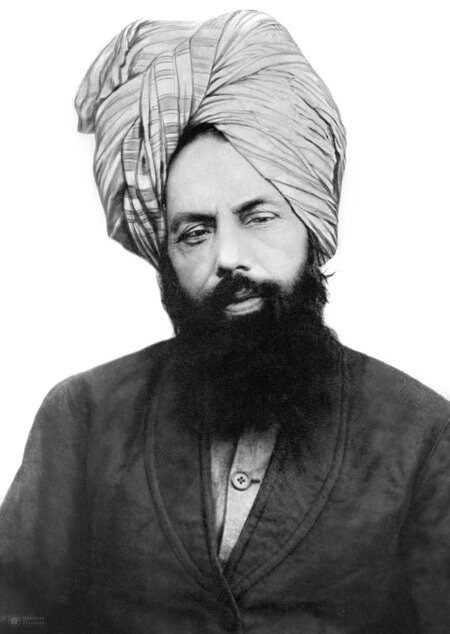

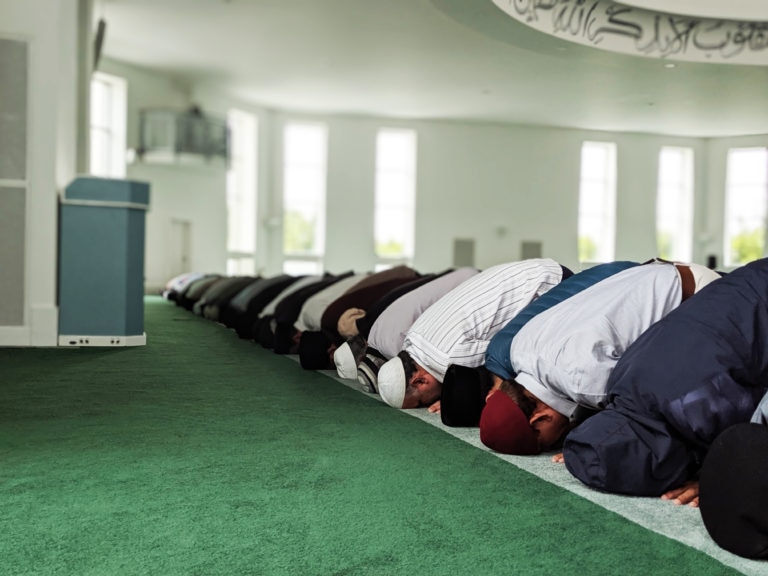
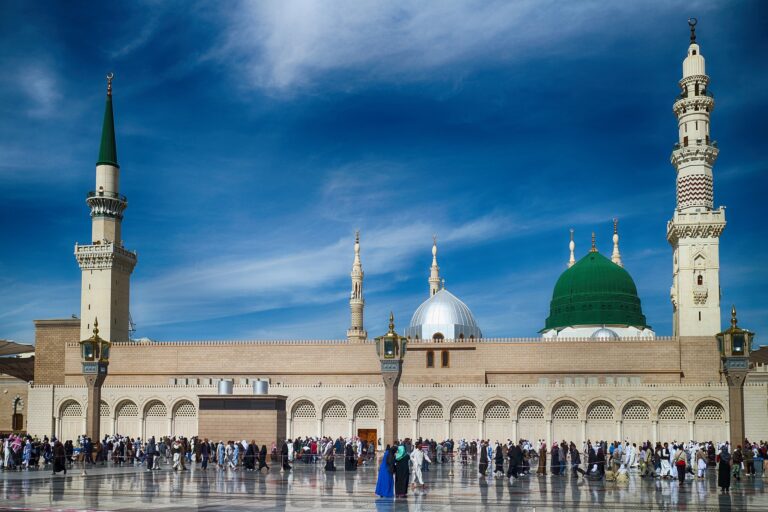
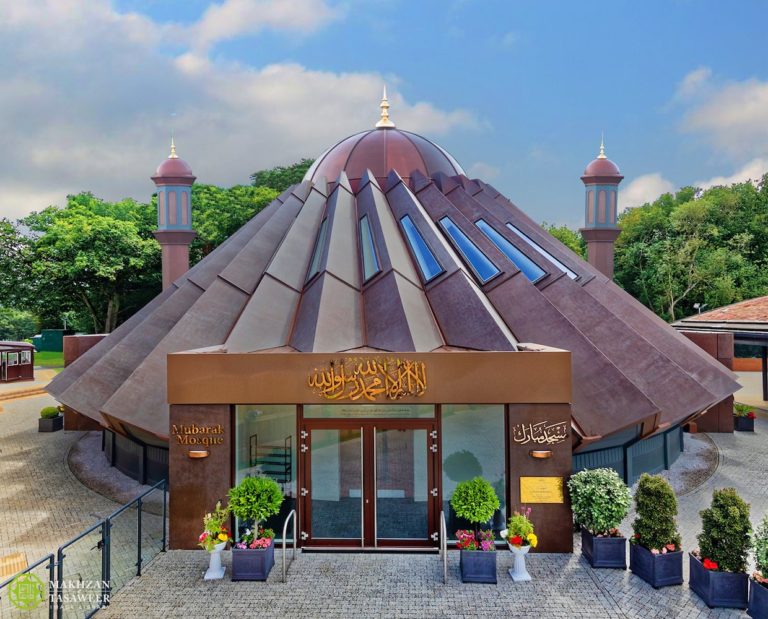

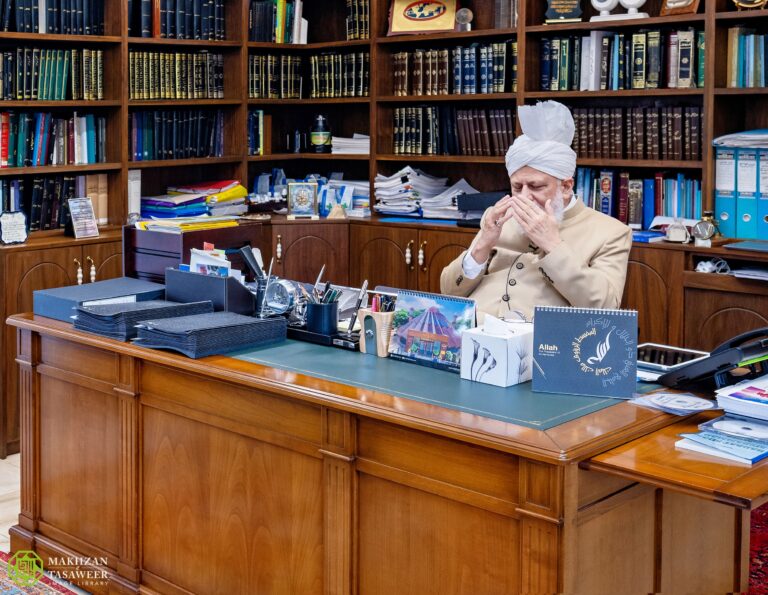

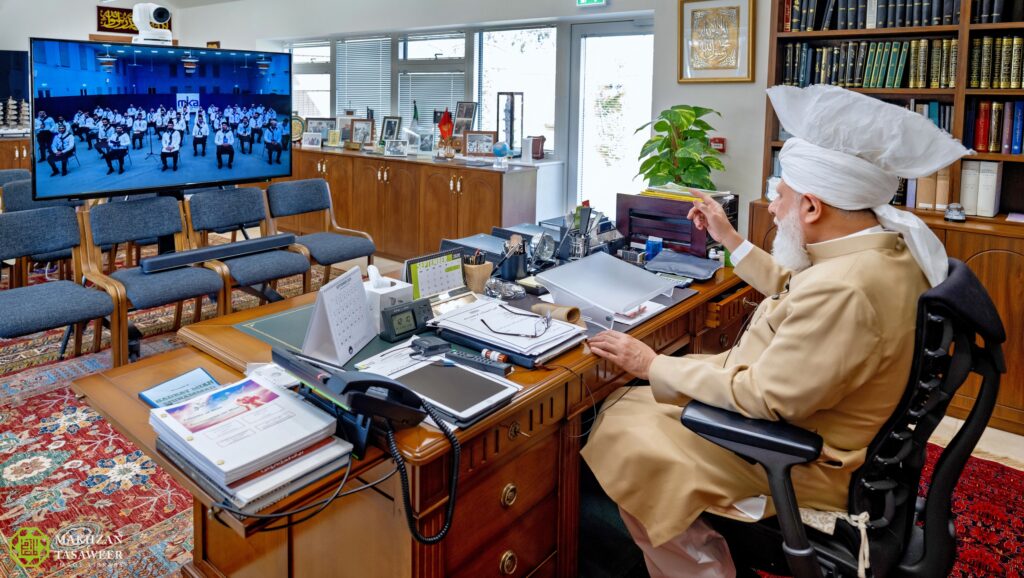
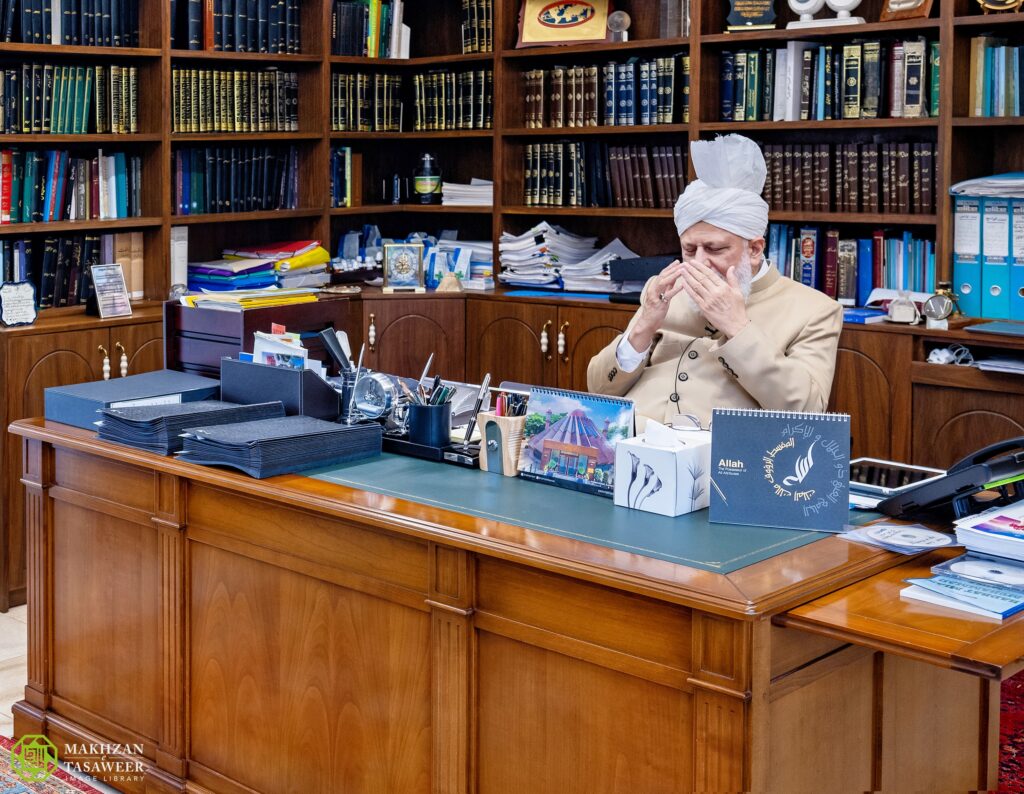
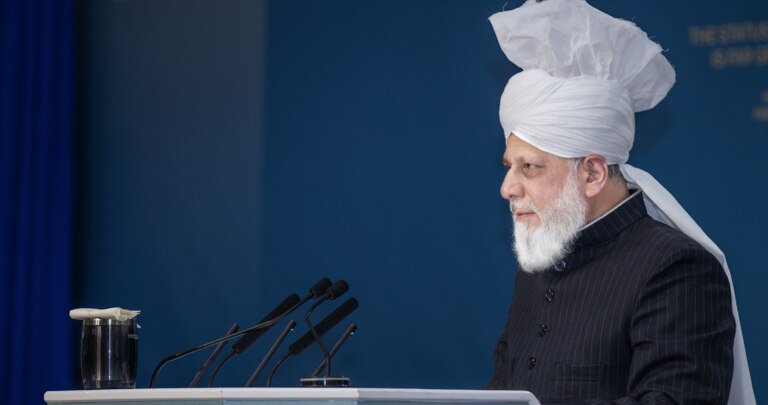






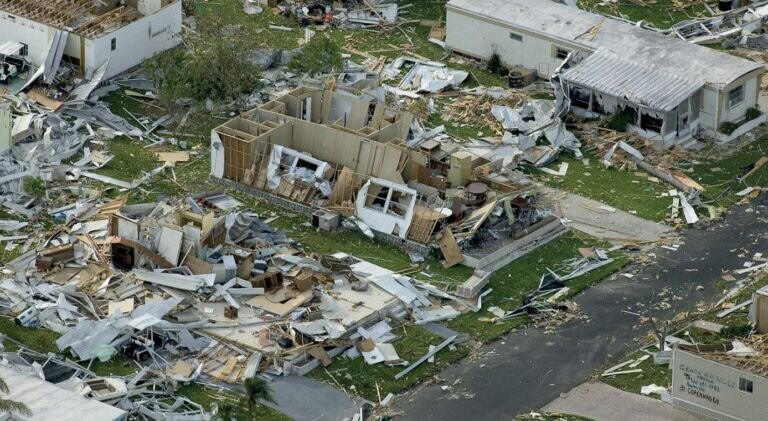
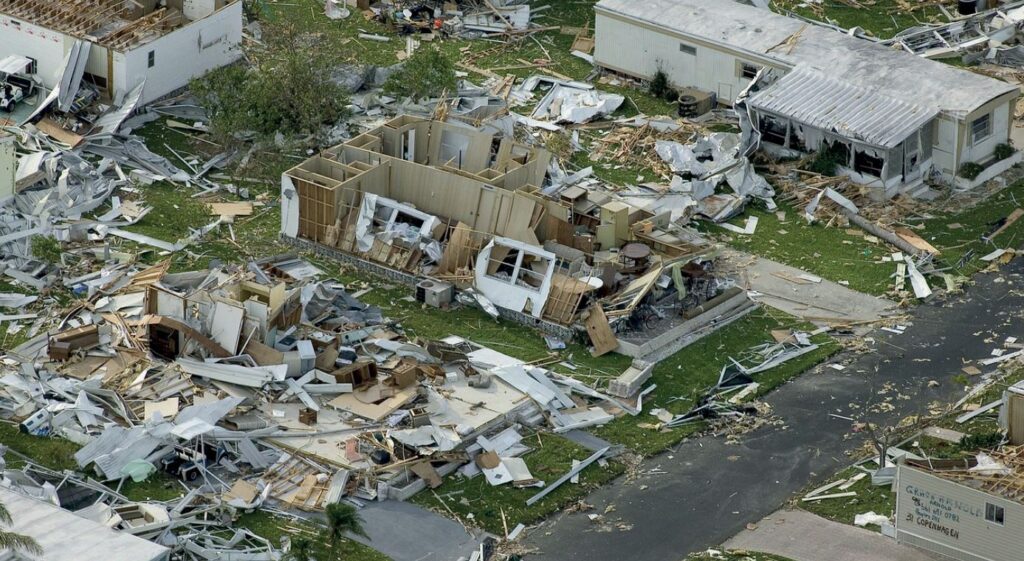
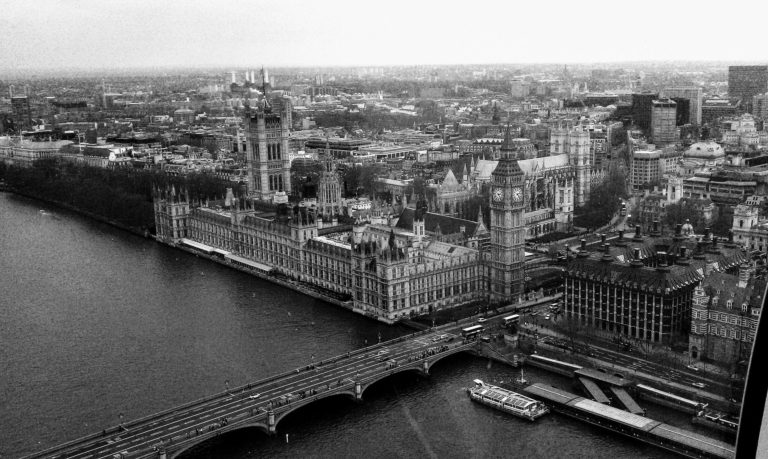
![Who was behind the Arabic works of the Promised Messiah a.s.? – Part III (Khutba Ilhamiyah [the Revealed Sermon]) Who was behind the Arabic works of the Promised Messiah a.s.? – Part III (Khutba Ilhamiyah [the Revealed Sermon])](https://www.alhakam.org/wp-content/uploads/2020/09/1-38.jpg)
![Who was behind the Arabic works of the Promised Messiah a.s.? - Part III (Khutba Ilhamiyah [the Revealed Sermon]) 13 1 37](https://www.alhakam.org/wp-content/uploads/2020/09/1-37.jpg)
![Who was behind the Arabic works of the Promised Messiah a.s.? - Part III (Khutba Ilhamiyah [the Revealed Sermon]) 14 2 21](https://www.alhakam.org/wp-content/uploads/2020/09/2-21.jpg)
